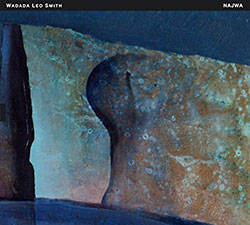
This is a disc one can wrestle with: stylistically, aesthetically, intellectually, and emotionally. And you know what? It wrestles right back. This is a work with an instinctual grasp of its historical precedents, performed by players whose shared collective experience within the various subphylums of 'jazz' (avant, free, fusion, jazz-rock, spiritual) collide throughout in ways that are wholly unexpected, consistently galvanizing, fiercely energetic, and incomparably staged. The sounds that, yes, erupt out of the speakers alternate breathlessly between elusive soundscapes and brazen flamboyance, but the sense remains throughout that Smith, like the best conductors, commands the reigns while simultaneously allowing the hive-mind to explode, fully formed and weaponized, when necessary. Najwa comes right out of the starting gate with a charisma rarely seen in contemporary jazz; it hits you on a gut-level, loaded for bear.
Smith's recorded legacy now encompasses over four decades of uncompromising idiomatic composition, from his earliest work with Anthony Braxton and Marion Brown, to an all-encompassing passion for sound and vision that breathed fire music, free improv, electroacoustic modernism, and realms both accessible and avant in equal measure. It's arguable that his steady ascension as an artist of unquestionable skill and facility has only become more robust with age; his body of work in the 21st century alone reveals a restless spirit constantly reinventing itself. Najwamight well be one of Smith's most visceral, powerful recordings, and that's saying something. The line-up assembled reads like a veritable who's-who of the jazz cognoscenti, with no less than four guitarists (Henry Kaiser, Brandon Ross, Lamar Smith, and Michael Gregory Jackson), erstwhile journeyman bassist Bill Laswell, avant drummer/tactician Pheeroan akLaff, and percussionist Adam Rudolph. And right from the get-go, Smith & co. mark out their perimeters with dazzling aplomb. The opening salvo, ostensibly an homage to Ornette Coleman and his harmolodic innovations, seems rather incongruously titled, the fire at its molten core more redolent of Miles Davis's searing "Agharta" or "Big Fun" than anything Coleman pioneered, either pre- or post-Prime Time. But through Smith's wiry, serpentine horn lines, akLaff's rhythmic turbulence, Laswell's earthen bassquake, and the four intertwined guitarists' textural smears, Coleman's elasticity and pungent phraseology seeps through, and when the collective comes down for an atmospheric break around the halfway mark, Smith's sultry tone maps out a series of probing, ghostly cadences that channels Ornette's own exploratory gestures.
And that's just the beginning. Each player adheres to a strong sense of cohesion within the music's boundaries, even when the maelstrom is at its most thunderous, even when all concerned are in danger of flying apart. 'Freedom', as parlayed across the entirety of Najwa, signifies a course of action instead of an imperative. Smith's guidance is key; he's the sinew binding the entire enterprise together, and, like Miles, understands how to artfully construe the ideas underpinning free playing versus outright anarchy. As the incendiary groove of "Ohnedaruth John Coltrane..." grows, initiated by Laswell's subtle electronic effects and akLaff's force-of-nature propulsion, the group does indeed ascend to the heavens, but not before traversing currents laced with brittle funk, edgy contemplation, and tentative atmosphere. Here is where the ghosts of Miles's venerated ensembles are reincarnated, particularly the divine spirits who empowered his 70s hydra-headed beasts. When Smith and sundry dig further down the groove, moving effortlessly into the yet more slippery funk of "Ronald Shannon Jackson...", akLaff and Rudolph take turns splitting the sky open, as Kaiser and his cohorts spray acid over the landscape like so much errant graffiti, Laswell's bass stalks about, and Wadada himself emits arcing cascades of notes that rise forcibly over the fray.
Fusion didn't die. It's right here, nestled within one of the best releases of 2017. Buckle up.
Comments and Feedback:
|



